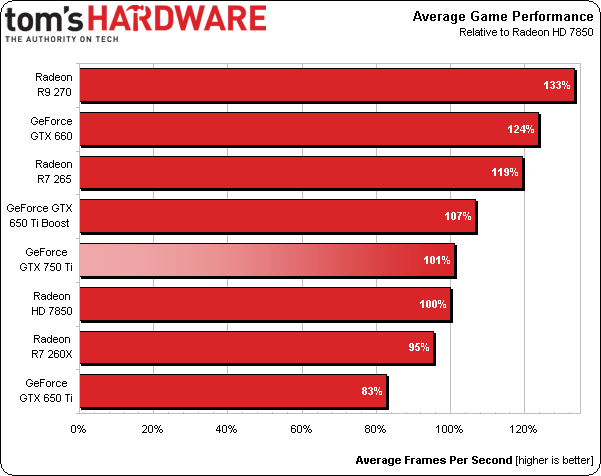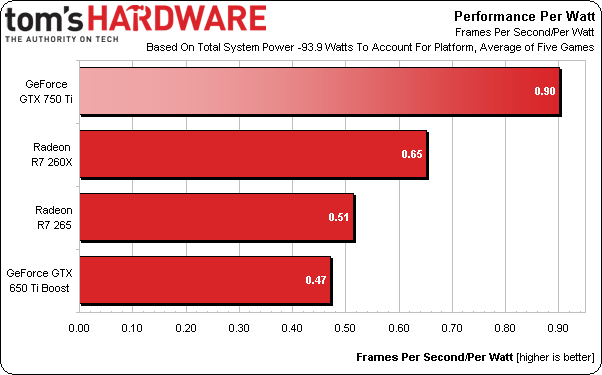GeForce GTX 750 Ti Review: Maxwell Adds Performance Using Less Power
Average Performance And Performance Per Watt
When we average the performance of all of these cards across all of our benchmarks, the GeForce GTX 750 Ti appears to perform a lot like AMD's older Radeon HD 7850. Although that's a decent accomplishment in and of itself, since the 7850 launched at $250 (and the only card in stock on Newegg still sells for $200), it's made even more impressive when you consider that the Maxwell-based board doesn't even need an auxiliary power connector.
AMD recently cut the prices on many Radeon R7 260X cards, improving their value. Sapphire's implementation comes overclocked from the factory, includes 2 GB of GDDR5 memory, and can be found for about $130, making it a good upgrade option for gaming at 1920x1080.
Digging further, we took the average performance of all cards across five games, and then recorded detailed power usage stats during the runs. Using those results, we calculated the average frame rate per second per watt:
This is the chart that matters when you want to fold a 60 W TDP into the performance discussion. Nvidia's GeForce GTX 750 Ti really shines, almost doubling the performance/watt of AMD's Radeon R7 265 and Nvidia's GeForce GTX 650 Ti Boost. The Radeon R7 260X fares better, but still trails the GM107-based card's efficiency by a significant distance.
Get Tom's Hardware's best news and in-depth reviews, straight to your inbox.
Current page: Average Performance And Performance Per Watt
Prev Page Results: Metro: Last Light Next Page GPU Boost And Overclocking-
meluvcookies on performance, I'll take the extra frames of the 265, but damn, for 60w, I'm totally impressed by this card. both the 750Ti and the R7 265 would be decent upgrades from my aging GTX460.Reply -
s3anister ReplyBut without the big cooler, GTX 750 Ti is daintier than a lot of sound cards we've tested.
I'm pretty sure you meant to type "video cards" on page one there. Cheers. -
Bloob AlsoReplyIt’s difficult to make this story all about frame rates when we’re comparing a 60 W GPU to a 150 W processor
Is a bit confusing. -
cangelini Reply
Actually meant sound card :) It's definitely smaller than a small video card, but I even have sound cards here that are larger.But without the big cooler, GTX 750 Ti is daintier than a lot of sound cards we've tested.
I'm pretty sure you meant to type "video cards" on page one there. Cheers. -
Sangeet Khatri Well.. there is not a lot of performance in it, but I love it for a reason that it is a 60W card. I mean for 60W Nvidia has seriously nailed it. The only competition is way behind, the 7750 performs a lot less for similar wattage.Let's see how AMD replies to this because after the launch of 750Ti, the 7750 is no longer the best card for upgrading for people who have a 350W PSU.I don't generally say this, but Nvidia well done! Take a bow.Reply -
houldendub Nice little card, awesome! I feel like this would be an absolutely awesome test bed for a dual chip version, great performance with minimal power usage.Reply -
thdarkshadow The whole time I was reading the review I was like it isn't beating the 650ti boost... :( but then I remembered it uses less than half the power lol. I am impressed nvidia. While I make purchases more on performance than power consumption I can still appreciate what nvidia is doingReply -
houldendub Reply12707408 said:Anybody else notice the lesser shaders and TMUs on the Zotac card in GPU-Z?
Don't take this as fact, but the drivers look newer for the Zotac card than the others, possibly just a bug with the older drivers? The cards are advertised as having 640 shaders anyway.
Also weird, the GPU-Z screenshot is taken with Windows 8, whereas the Gigabyte and MSI cards are on Windows 7. The mystery continues...


